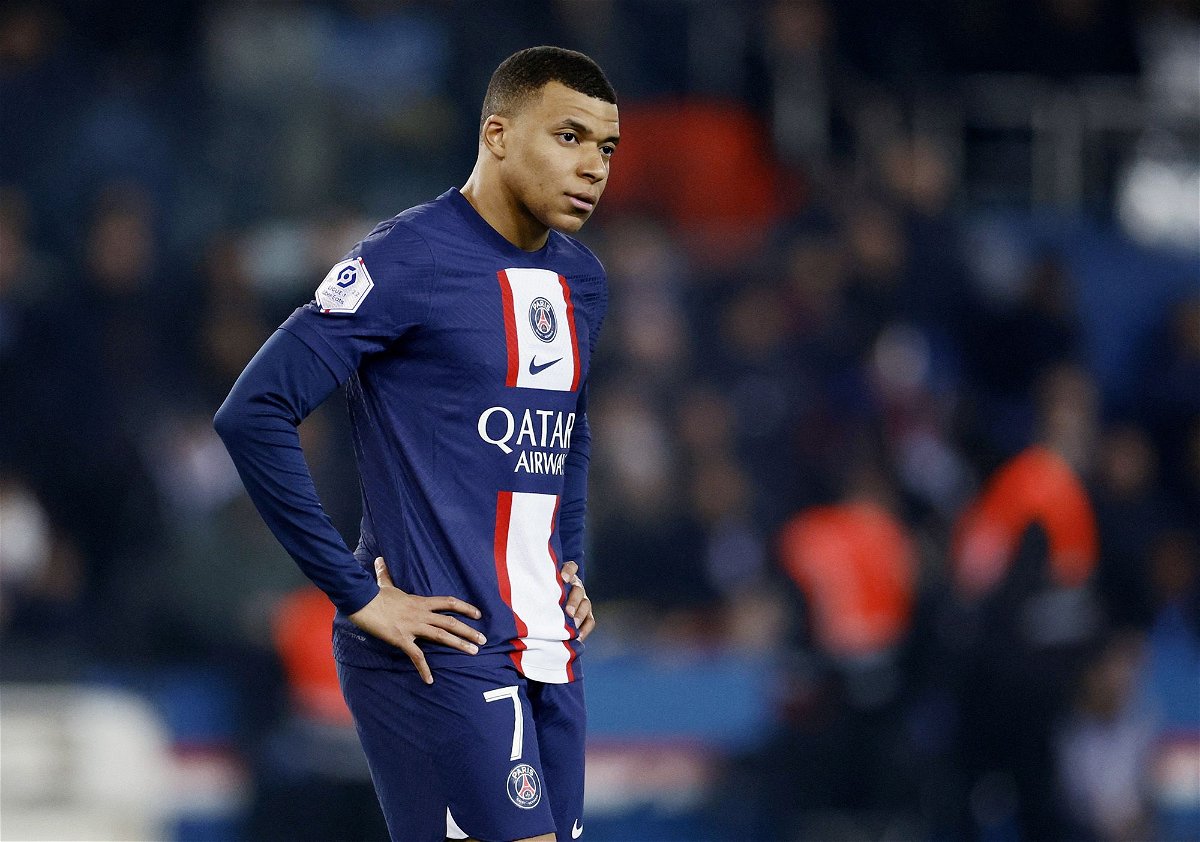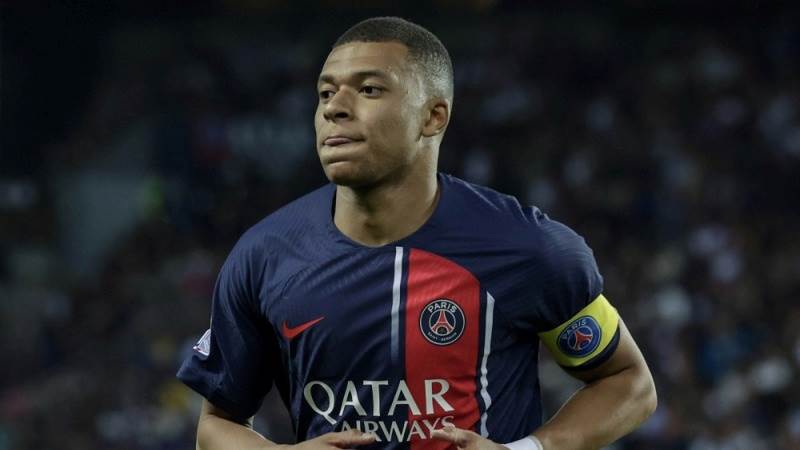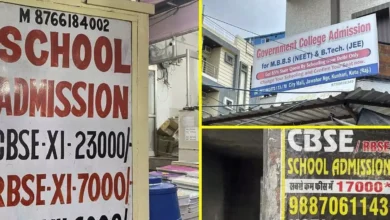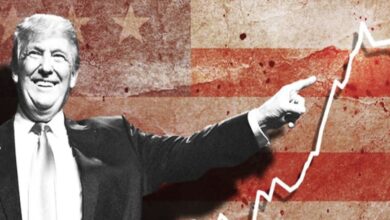Al-Hilal Makes Record-Breaking Bid for Mbappé with Unbelievable Salary Offer of Rs. 2,700 crore

Al-Hilal Makes Record-Breaking Bid for Mbappé with Unbelievable Salary Offer of Rs. 2,700 crore
In a surprising move that has shocked the football world, Saudi Arabian club Al-Hilal has offered an incredible Rs. 2,700 crore to sign French superstar Kylian Mbappé. This bid breaks all previous transfer records and includes an astonishing salary of Rs. 6,350 crore for the talented forward.

The news of this groundbreaking bid was leaked by undisclosed sources close to the deal. Al-Hilal, backed by wealthy investors, wants to boost its global status by signing one of the best players in the world. If the deal happens, it would be a huge shift in football and make Al-Hilal a dominant force in the sport, elevating Saudi Arabian football’s reputation.
Kylian Mbappé, a 24-year-old sensation, is known for his incredible speed, dribbling, and goal-scoring abilities. He has been a star at Paris Saint-Germain (PSG) and has attracted interest from many top European clubs. However, Al-Hilal’s offer has taken everyone by surprise.
The main focus of the bid is to secure Mbappé’s services for a long time. The proposed salary package is the highest ever seen in football, and Al-Hilal’s investors believe it will bring commercial opportunities, global exposure, and increased merchandise sales.

While some critics worry about the enormous figures involved, Al-Hilal’s investors see it as a strategic investment that could bring in more revenue through ticket sales, sponsorships, and TV deals. The potential of having Mbappé in their team has also excited Al-Hilal’s fan base, and they hope it will attract new supporters from around the world.
Al-Hilal’s management has neither confirmed nor denied the bid, stating their commitment to strengthening the team and competing at the highest level. However, there are challenges that could prevent the deal from happening. PSG may not want to let go of their prized player, and UEFA might scrutinize the deal for financial fair play violations.
Some football purists are concerned that such extravagant spending could widen the gap between rich and smaller clubs and affect fans’ accessibility to the sport. As we wait for further updates, football pundits speculate on how this move could impact Mbappé’s career. Moving to a less competitive league might raise questions about his abilities, but it could also be a fresh challenge that shapes his legacy positively.

If the bid succeeds, Saudi Arabian football could experience a transformation, inspiring a new generation of players and improving the sport’s infrastructure and development in the country. In the broader context, these record-breaking bids highlight the changing financial landscape of football, with some seeing it as a sign of commercial success while others worry about its impact on the sport’s core values.
Only time will tell if Al-Hilal’s bid for Mbappé marks a turning point in football or if it’s just a momentary disruption. Football must continue to evolve while staying true to its essence, bringing joy and unity to fans worldwide.
The staggering bid offered by Al-Hilal to sign Kylian Mbappé not only reflects the changing financial landscape of football but also raises questions about the long-term sustainability of such astronomical expenditures in the sport. While the idea of securing a global superstar like Mbappé can lead to increased commercial opportunities and global exposure, it also highlights the disparity between wealthy clubs and smaller teams, potentially affecting the competitive balance in football leagues.
The growing trend of big-money transfers and extravagant player salaries has been a topic of concern for football purists and enthusiasts alike. The immense financial power of some clubs allows them to outbid competitors and acquire top talents, leaving smaller clubs struggling to keep up and retain their best players. This can create a widening gap between the rich and smaller clubs, making it increasingly difficult for the latter to compete at the highest level. As a result, some fans worry that the sport may lose its essence as a level playing field for all, where hard work and talent alone can lead to success.
Moreover, the implications of such exorbitant spending extend beyond the football pitch. The financial burden of signing a player like Mbappé for record-breaking fees and salary demands can have far-reaching consequences on a club’s overall financial stability. It is not uncommon to witness clubs facing financial crises after spending excessively on transfers and player wages, leading to debt and potential instability in the long run.
Furthermore, the focus on big-name signings might overshadow investments in grassroots development and youth academies. While having a superstar player in the squad can undoubtedly attract fans and sponsors, nurturing local talent and investing in youth development is essential for the sustainable growth of football in any country. Smaller clubs may not have the resources to make such astronomical bids, but they can contribute significantly to the growth and development of the sport by focusing on youth development and promoting local talent.
Additionally, the potential move of Mbappé to a less competitive league like the Saudi Arabian league may raise questions about the level of competition and the impact on the player’s career. Playing in a less competitive environment could potentially be perceived by some as a step down for a player of Mbappé’s caliber, leading to speculation about how it may affect his performance and legacy. On the other hand, it could also present an opportunity for him to showcase his skills in a different context and potentially elevate the status of Saudi Arabian football on the global stage.
The UEFA’s scrutiny of the deal for financial fair play violations is another significant factor that could impact the outcome. Financial fair play regulations were introduced to promote financial sustainability and fair competition in football. If the deal is found to be in violation of these rules, it could result in sanctions for Al-Hilal and potentially affect the implementation of such mega-transfers in the future.
While the pursuit of Mbappé represents a bold and ambitious move by Al-Hilal, it also emphasizes the evolving nature of football as a global business. The sport’s increasing commercialization and the influx of wealthy investors have undoubtedly contributed to the escalation of transfer fees and player salaries. However, it is crucial for football’s stakeholders, including governing bodies, clubs, and investors, to strike a balance between commercial success and maintaining the core values and essence of the sport.
In conclusion, Al-Hilal’s unprecedented bid for Kylian Mbappé has sent shockwaves through the football world, sparking discussions about the changing financial landscape of the sport. While the potential signing of a global superstar can bring commercial opportunities and global exposure, it also raises concerns about the disparity between rich and smaller clubs, financial sustainability, and the impact on the sport’s core values. Football’s stakeholders must tread carefully and find a balance that allows for commercial growth while ensuring the sport’s accessibility, competitiveness, and long-term health. As the football community waits for further updates, the outcome of this bid could have far-reaching consequences for the future of football.




